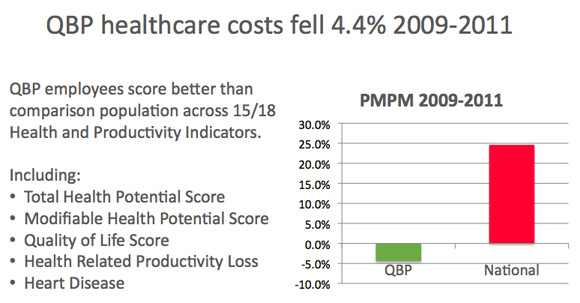
One of the most talked-about presentations at this week's National Bike Summit came from Jason Gaikowski, director of sales for the Bloomington, Minnesota-based wholesale distributor Quality Bicycle Products. Over the last several years, QBP has ramped up its employee health and wellness program, which includes incentives to bike to work. At a time when most employers are grappling with rising insurance premiums, a study by the company's health insurance provider, HealthPartners [PDF], suggests the program has helped reduce QBP's health care costs and increase employee productivity.
Gaikowski made the case that QBP's example bears a lesson for the nation's transportation policy makers: Investment in infrastructure that supports active transportation can help rein in the country's skyrocketing health care costs.
While you probably want to take research on the health benefits of cycling commissioned by a bike company with a grain of salt, Gaikowski's basic premise has already been embraced by the experts at the Centers for Disease Control. The QBP/HealthPartners case study adds some intriguing data about the potential impact of bike commuting on employee health and the corporate bottom line, and it suggests some areas ripe for further study.
As part of its wellness program, QBP offers a few inducements for employees to commute by bike: The company provides secure parking and showers at work, and it pays employees $3 each day they ride to work. The cash payments add up to about $45,000 each year.
While the study doesn't isolate the impact of bike commuting on lower health care costs, the program seems to be paying off. HealthPartners reported that participants in the "Bike to Work" program (about 100 of QBP's 464 employees) cost approximately $200,000 less per year in health care claims annually, based on a comparison with employees who don't participate in the program.
QBP's overall health care expenses declined 4.4 percent between 2009 and 2011, according to the report, while on average health care costs for American companies rose 24.6 percent during the same period. HealthPartners attributes some of the decline to QBP's Bike to Work program, as well as employees' healthier eating habits and a shift to generic drug purchases.
In addition, HealthPartners reported that QBP's health and wellness initiative, of which the Bike to Work program is the most significant component, is boosting employee productivity. With employees missing fewer work days due to health-related problems and overall health scores improving, the insurer estimates that the wellness program prevents the equivalent of $300,000 per year in lost productivity.
"I know that at QBP we have found that very simple and affordable investments to remove barriers to bicycle commuting have paid substantial returns to our business in decreased health care costs, increased productivity, and the overall well being of our company," says Gaikowski. "My hope is that similar common-sense investments in our national infrastructure will be made – and pay similar returns to our citizens."





